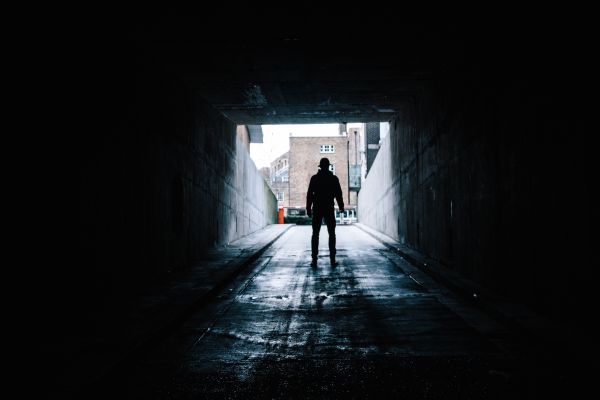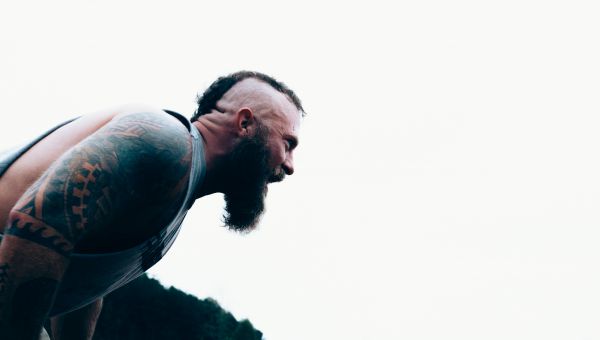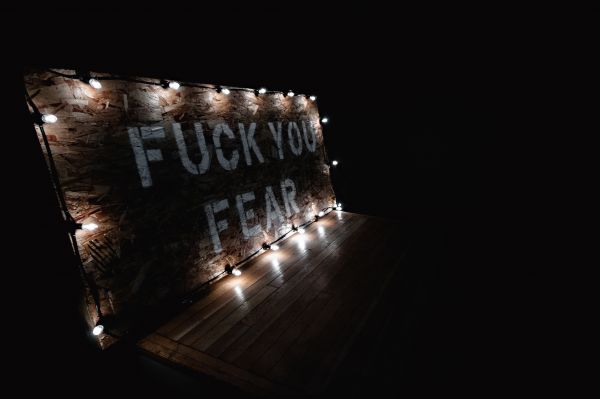How to Be Brave: 13 Effective Tips to Be Braver (Starting Today)
If you’ve been wondering how to be brave and bold, you’ve come to the right place.

It’ll allow you to take action more easily on a daily basis, whether it’s to approach an attractive girl, to make a public speech, to fight, and so on.
It’ll help you live your life on your own terms and greatly enhance the way you feel about yourself.
Let’s dive right in.
1. Understand that fear is normal:
Most people think that to be brave is to not feel fear.
They think that to be brave means never being afraid.
They think that it’s being fearless.
But it’s not exactly that.
Being brave is to feel fear…and act anyway.
It is to act in spite of fear.
The man who is never afraid can’t really show bravery.
Taking action when there’s no fear doesn’t require any bravery.
In these circumstances, it is not difficult to take action. It’s rather easy.
On the other hand, when there’s fear or anxiety, that’s another story.
It’s when taking action is difficult that you need to be brave.

So, if you’re wondering how to be brave in life, the first thing you need to understand is that it’s okay to be afraid.
Having this in mind will help you avoid panicking when you start feeling afraid or when you sense a rush of adrenaline in a stress-inducing situation.
Because you’ll know that being afraid is normal.
And that it’s precisely because you’ll feel fear and anxiety that you’ll be given the opportunity to show bravery.
Understand that being brave doesn’t mean being fearless, but instead taking action while being afraid.
2. Start slowly:
Courage is like a muscle.
It needs to be trained in order to perform well.
 And how do you train a muscle?
And how do you train a muscle?
By overloading it step by step.
If you want to be more muscular but you’ve never lifted weights, you’re not going to try to bench-press 300 pounds for your first workout.
You’re going to start with weights that are much lighter.
And over the time, you’re going to increase the weights you use for your exercises.
That’s how you build your muscles.
And it works pretty much the same way when building your courage.
If you don’t feel like you are a courageous guy—in other words, if you don’t have a big and strong courage muscle—you’re going to start with situations you can cope with.
Not with situations that require an extreme bravery.
For instance, if you’re too afraid to start a conversation with a girl on the street, you can start with something easier, such as asking for directions.
Once you feel at ease asking for directions, you can increase the difficulty by adding a compliment.
And so on.

Training yourself to take action in minor stressful situations is going to train you to act in spite of fear.
It’s going to become a habit.
And you’ll need less and less bravery to act in those situations, just like how the weights you used in your first workouts will seem quite light after a few weeks of training.
And over time, you’ll be able to take action in situations that were way too frightening at the beginning of your training.
So keep in mind that courage is like a muscle.
It needs to be trained.
Step by step.
And on a regular basis, which leads us to tip number 3…
3. Exercise your courage on a daily basis:
As you’ve learned, courage is like a muscle.
If you stop using it, it atrophies.
If you stop training it, it gets weaker.
Not overnight, sure. But as time passes, it becomes more and more obvious, and by the time you’ve realized what’s happening, you’ve already lost a significant amount of strength and size.
To maintain (and increase) your muscle mass, you should use it.
You should train it every week.
If you make it a habit of avoiding stressful situations, you’re going to become less and less courageous.
Your courage muscle is going to atrophy.
Your comfort zone is going to shrink.
And in the end, you’ll be unable to take action in even the most minor stressful situations.
On the other hand, if you keep training your courage muscle on a daily basis, you’re not only going to maintain it, you’re also going to reinforce it (especially if you make sure to increase the difficulty of your training by increasing the level of required bravery to take action).
4. Be more afraid of what you’re going to think of yourself than of the consequences of whatever action you’re taking:
Like a lot of people, you probably focus way too much on the negative consequences of your taking action.
When it’s time to act, you start to invent all sorts of stories in your head on the premise that you’re going to fail.
Not only does this lead you to focus on destructive thoughts which are going to make you feel less able to succeed, but it also keeps you from taking action by making you afraid, more afraid than you were at the beginning.
You’re so afraid of the consequences that you might suffer by taking action that you don’t make a move at all.

If you want to focus on negative consequences, there’s a better way…
You can focus on the negative consequences of NOT taking action rather than on the negative consequences of taking action:
The regrets of having done nothing, shame, disappointment in yourself…
I don’t need to explain this to you; you know it as well as I do.
By focusing on what you’re going to feel if you DON’T take action, you’re going to feel a strong urge to make your move.
Because you’ll want to avoid all those negative thoughts and feelings which come from an absence of action.
This tip has worked quite well for me. It might also help you quite a lot.
Give it a try.
5. Build your self-image:
When you see yourself as a brave man, you have more chances to act as such.
Why is that?
Well, because we want to be consistent with our self-image.
If you see yourself as a strong masculine manwho is able to take action in spite of fear, you’ll have much more of a chance of acting as such when the moment comes.
You’ll have developed enough self-esteem to push yourself to be proud of yourself in these situations.
That’s why building a strong identity can have a significant impact on how brave you can be.
Being conscious of your value and building a solid level of self-esteem can dramatically help you overcome fear and take action.
You won’t want to disappoint yourself (remember tip number 4).
6. Keep your sperm:
Ejaculating makes you less brave (at least during the first 24 to 48 hours after ejaculation).
When you ejaculate, you release a powerful masculine energy that you could have harnessed to accomplish great things.
After ejaculating, not only do you feel tired, but you’re also less willing to do certain things, especially things that require effort and courage.
And conversely, when you haven’t ejaculated for days (or weeks), you feel much more energetic and confident.
When your gun is loaded, you feel much more powerful.
You’re much more willing to undertake some difficult and frightening tasks.
In other words, you are braver.

Did you know that in order to replenish your sperm’s reserves, your body spends as much energy (if not more) as it does to replenish your blood’s reserves after donating blood?
If you have a bad habit of masturbating and ejaculating on a daily basis, stop for a few days, then ejaculate again and you’ll feel the difference.
Now, I won’t tell you to never ejaculate. Ejaculating a few times every month is fine (and necessary), but try not to ejaculate more than 1 to 2 times per week.
Don’t ejaculate so often that you feel tired and powerless all the time.
And avoid porn (it makes you want to ejaculate, not to mention its other drawbacks).
7. Sleep enough:
According to some studies, sleep deprivation might dramatically lower testosterone in men.
Since your ability to be bold and act in spite of fear is at least partly associated with high testosterone levels, a lack of sleep may have a negative impact on your ability to be brave.
But besides this, it isn’t difficult to imagine how a lack of sleep could hamper your ability to take action in spite of fear:
When you’re tired, you have less motivation, you feel more lazy, and you come up with more excuses to not make a move.
For all these reasons, make sure you sleep enough (something between 7 and 9 hours every night).
8. Think of the satisfaction you’ll get from taking the leap:
When you overcome your fears, you’ll be proud of yourself.
Even if you failed.
You’ll be proud to have taken action in spite of your fear.
The bigger the fear, the bigger the satisfaction you’ll get from taking action.
Sometimes it feels so good that it seems like a drug.
Thinking of this huge satisfaction at the moment you need to make your move can help a lot when it comes to showing bravery in the moment.
Instead of focusing on your fear or on the negative consequences that taking action might bring, just focus on the positive feelings you’re going to have when you’ve taken action, whether you succeed or not.
The real success lies in your taking action.
If you get in the habit of taking action on a regular basis, you’re going to build up your courage muscle and multiply your opportunities for succeeding.
9. Find a strong why for your action:
When you know why you’re fighting—and you can embrace this cause—you fight better and more valiantly.
Conversely, when you don’t know why you’re fighting, you feel less motivated, and you’re less likely to undertake certain actions. You find more excuses for staying idle.
To be more brave, find deep and important reasons why you should take action.
Always have something which deeply motivates you.
10. Get inspired by brave models:
Models are powerful in a sense that they give you a direction.
They guide you by example.
You can find models in your surroundings, on social media, in books, in movies…be it fiction or history.
Some people are inspiring and can be taken as models of bravery.
Emulating good models can help you make progress.
Now, you should be cautious and only replicate what is good and solid, and not choose poor models who lead you in the wrong direction.
11. Put a label on your fear:
When you observe an emotion or a feeling, it loses its control over you.
Be it when you’re afraid or when you’re angry.
Stopping your flow of thoughts in order to return to the present moment by just watching and listening to the emotion and its associated feelings is very effective when it comes to overcoming your fear.
 When you observe an emotion and describe it, it starts to diffuse and lose its power over you.
When you observe an emotion and describe it, it starts to diffuse and lose its power over you.
Conversely, when you let the flow of thoughts associated with this emotion run into your head, they get stronger and stronger.
Your anxiety feeds on all these negative thoughts, and it gains more and more power over you.
Recognizing when you’re afraid is a step towards lowering your fear (or at least towards a less incapacitating fear).
Instead of focusing on your thoughts, you focus on the emotion itself and its associate feelings.
This way, you cease allowing a flow of thoughts leading to anxiety.
And you break the vicious cycle keeping you from taking action.
So, next time you feel a negative emotion, observe it, listen to it, and put a label on it.
It will force you to return to your body and thus feel much more at peace.
12. Disconnect your mind:
Sometimes you just need to force yourself.
You just need to take the leap.

There will be times you won’t be able to regulate your flow of thoughts to feel more serene.
And in such cases, there’s only one thing to do:
Disconnecting your mind from your body.
As if your mind didn’t have any control over your body anymore.
You just force your body to take the action you want it to take, knowing that the mind will follow when you get your feet wet.
This technique is particularly useful when it comes to doing some frightening things for the first time. When you don’t have any past experience that can reassure you (for instance, approaching a girl on the street when you’ve never done it before, throwing a punch, and so on).
13. Celebrate:
When you manage to do something brave, celebrate.
Celebrate whenever you do something you’re scared to do.
Even if it’s something that looks insignificant.
What it will do is train your brain to associate stress with pleasure.
It will make you want to look for those little scary situations which give you the opportunity to be brave and thus feel pleasure.
 So be proud of yourself each time you do something brave.
So be proud of yourself each time you do something brave.
Let yourself feel all the positive feelings and emotions associated to it.
Know that each time you act courageously is a step towards more bravery.
If you enjoyed this article (and even if you didn't), I invite you to take the SOLIDITY test.
Taking this test will allow you to assess how solid your game is.
There are a few questions you need to answer by checking the boxes that best apply to you, and that's all.
Once you've answered all the questions, you’ll immediately get your results as well as my analysis and some useful tips to improve yourself.
How to Be Brave: 13 Effective Tips to Be Braver (Starting Today)
![How to Be Brave: 13 Effective Tips to Be Braver (Starting Today)]() Reviewed by Birendra Adhikari
on
April 24, 2020
Rating:
Reviewed by Birendra Adhikari
on
April 24, 2020
Rating:
No comments: